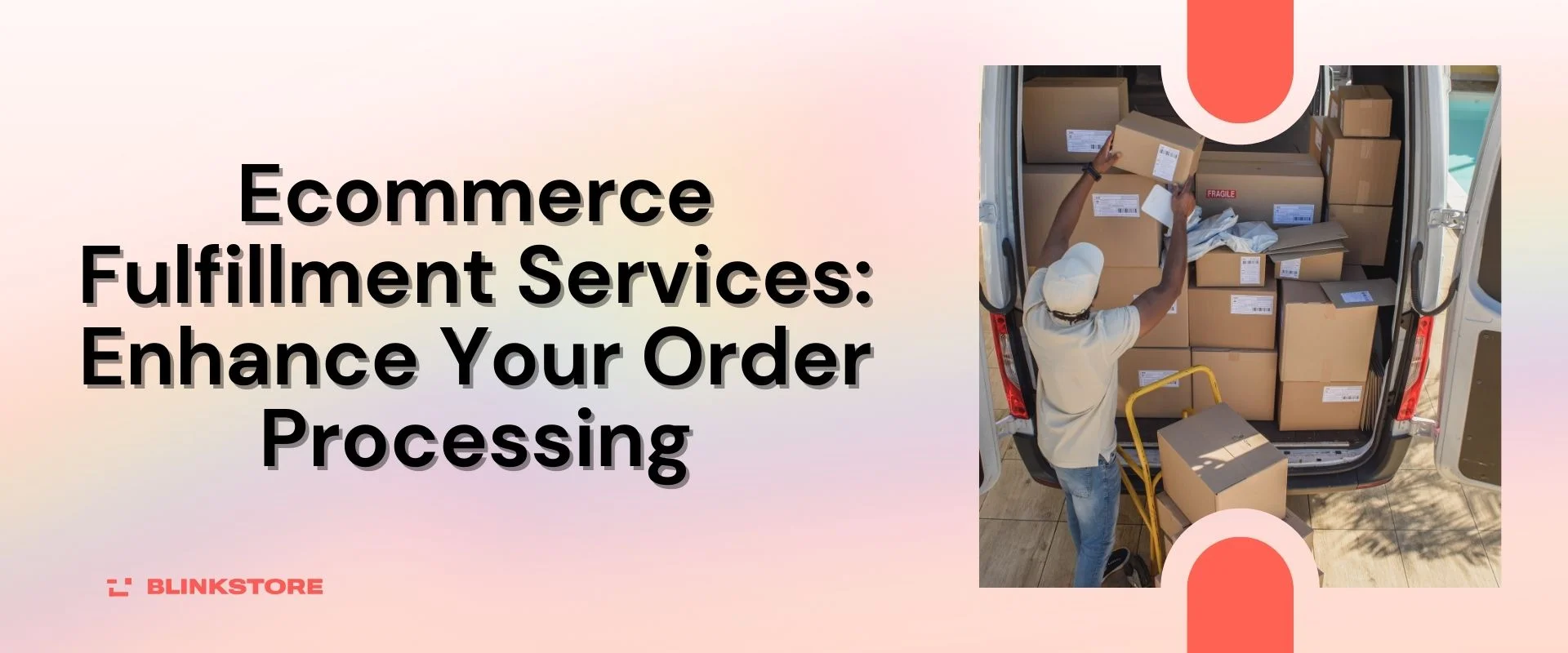In today’s online shopping world, getting orders right is key to success. For instance: someone clicks “Buy Now” on your website. That kicks off the order process—getting the item from your shelf to their door.
Research indicates that 85% of online buyers state that a bad delivery experience would make them not order from that particular online seller again. Thus, completing orders flawlessly increases satisfied clients and recurring business.
Table of Contents
Ecommerce order fulfillment involves every step. From when a customer initiates an order to when they receive it. Think of it like a virtual assembly line where each stage from order receipt. Processing to careful packing and timely shipping is managed. For guaranteed customer satisfaction.
This smooth process serves as the foundation of any online retail. Ensuring customers get their orders accurately and promptly, thus nurturing trust and loyalty.
What is Order Fulfillment in Ecommerce?
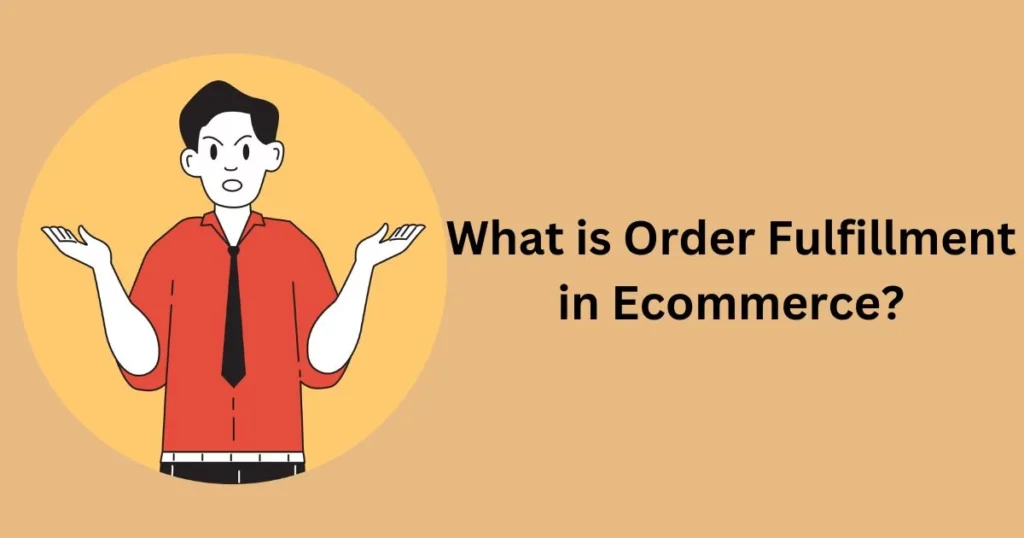
Order fulfillment in ecommerce is the whole process of getting an order from a customer’s click to their doorstep. It involves receiving the order, packing it up, and sending it out for delivery.
It’s about fulfilling the customer’s purchase request accurately and efficiently.
What is Ecommerce Fulfillment Center?
An ecommerce fulfillment center is like a big storage space where online stores keep their products. When you order something online. The items are picked from this center, packed up, and shipped to you.
It’s basically a hub that helps online shops manage and send out their orders to customers.
Core Elements of Ecommerce Fulfillment Services
When it comes to ecommerce fulfillment services, making things run smoothly is super important. These are the key elements you should be aware of:
1. Warehousing and Inventory Management
- Central Hub: A well-organized warehouse is like the heart of your operation, keeping all your stuff in check.
- Inventory Tracking: Use strong systems to keep an eye on how much stock you have, so you don’t run out or have too much.
2. Order Processing and Packaging
- Smooth Process: Getting orders ready to go should be easy and quick, so your customers are happy.
- Efficient Packaging: Pack things up nicely to keep costs down and make sure products are safe during delivery.
3. Shipping and Delivery
- Partnering with Carriers: Work with reliable delivery companies to give customers different options and good prices.
- Being on Time: Make sure packages get to customers when they expect them to, so they’re happy with your service.
4. Returns Management
- Easy Returns: Make it simple for customers to send things back if they need to, and handle the process well.
- Checking Quality: Look closely at returned items to see if they’re good to sell again or need fixing up.
5. Technology Integration
- Using Automation: Use software to help with processing orders, managing stock, and tracking shipments.
- Connecting Systems: Make sure your ecommerce website and fulfillment tools work together smoothly. Thus, you are always aware.
6. Customer Support
- Helping Quickly: Be there to answer questions and solve problems for customers right when they need it.
- Lots of Ways to Reach Out: Give customers different ways to get in touch like email, live chat, or phone calls.
7. Scalability and Flexibility
- Growing with You: Pick a service that can handle your business getting bigger or busier.
- Making it Yours: Choose a provider that can adjust their services. To precisely suit your company’s requirements.
Types of Ecommerce Fulfillment
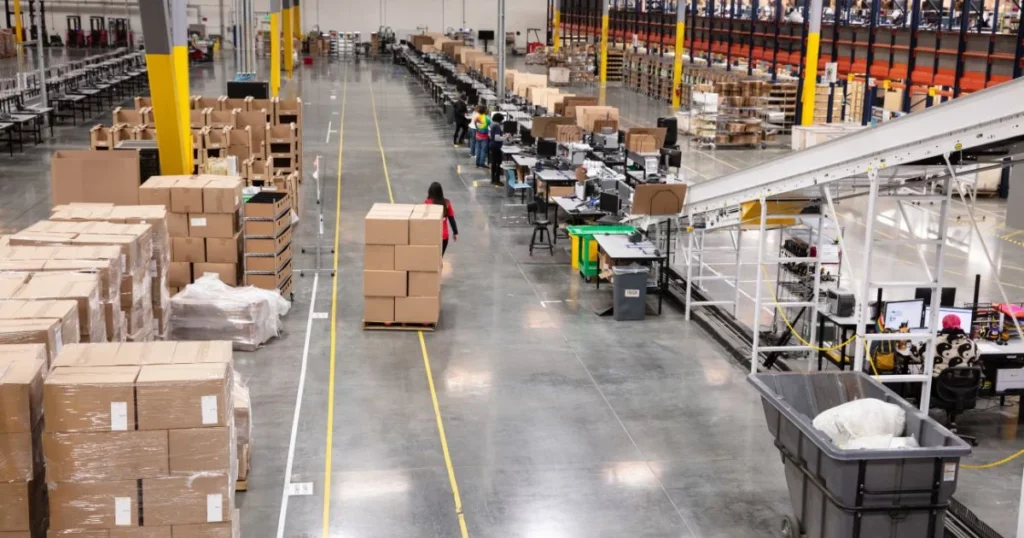
Identify the type of ecommerce your business is involved in:
1. In-house Fulfillment
Choose in-house fulfillment if you have the resources. And infrastructure to manage order fulfillment internally.
It offers full control over the process. Allowing you to maintain quality standards and customer service levels.
Consider in-house fulfillment if you have consistent order volume. And want to maintain direct oversight of the fulfillment process.
Pros:
- You have full control over the process.
- You can ensure quality and customize as needed.
Cons:
- It requires a lot of upfront investment.
- It’s less flexible and harder to scale.
2. Third-party Logistics (3PL)
Opt for 3PL fulfillment if you want to outsource fulfillment operations to specialized providers.
It can save you time and resources. By making use of 3PL providers’ infrastructure and experience.
Choose 3PL fulfillment for flexibility and scalability. As providers can adapt to fluctuations in order volume and offer access to advanced technology solutions.
Pros:
- You can outsource tasks and save time.
- You gain access to expertise and infrastructure.
Cons:
- You have less control over the process.
- It can add extra costs and reliance on third parties.
3. Dropshipping
Consider dropshipping if you want to start an ecommerce business. With minimal upfront investment in inventory and warehousing.
It’s suitable for businesses with limited capital. For those testing the market before committing to holding inventory.
Choose dropshipping if you’re willing to accept lower profit margins. In exchange for reduced risk and operational complexity.
Pros:
- You need minimal upfront investment.
- It’s low-risk and flexible for testing new products.
Cons:
- Profit margins are lower.
- You have less control over product quality and shipping times.
4. Dropshipping Made Easy with Blinkstore
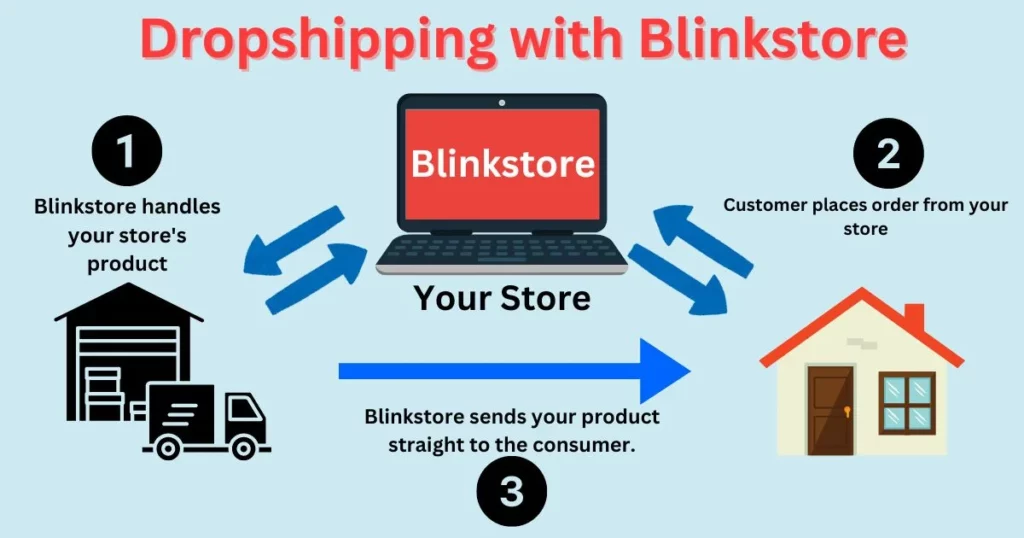
Why Blinkstore?
Start your E-commerce dropshipping with Blinkstore, and here is why Blinkstore is best for dropshipping:
- Easy Setup: No tech skills required – setting up your store is a breeze.
- Free to Use: Enjoy your own online store at no extra cost – Blinkstore is completely free to use.
- Wide Product Range: Choose from 50+ customizable products to fit all your business needs.
- Inventory Tracking: Keep track of your stock in real-time to avoid running out of items.
- Free Essential Features: Get access to key features like a user-friendly website, mockup generator, and mobile app – all for free.
- Automated Order Fulfillment: Streamline order management with our automated system, saving time and reducing errors.
- Payment Integration: Seamlessly accept payments from clients with popular gateways like Paytm, Razorpay, and CCAvenue.
Best Ecommerce fulfillment services in India
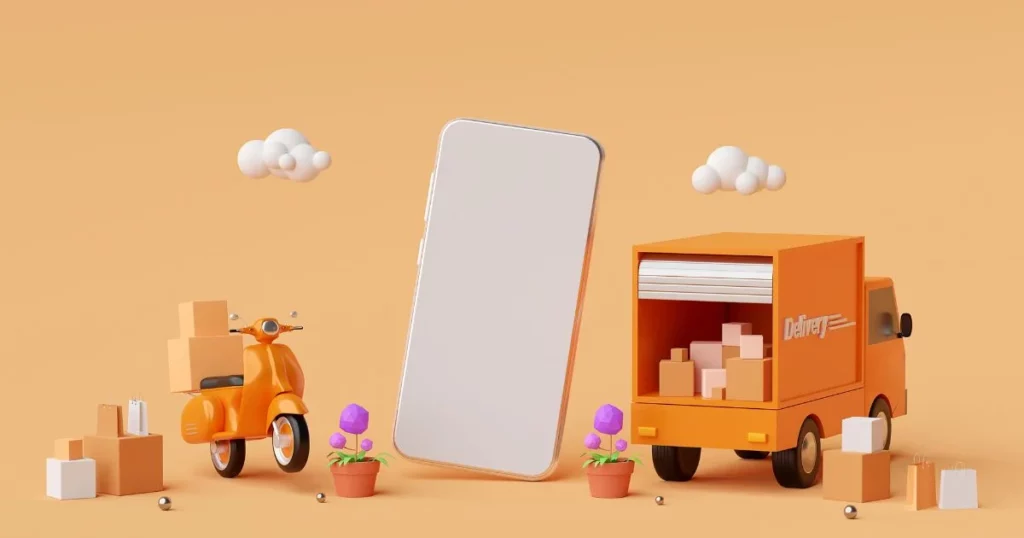
Among the array of ecommerce fulfillment services in India. Several stand out for their adaptability to businesses of all sizes.
1. Amazon Fulfillment Services (AFS)
Offers comprehensive solutions with access to Amazon’s vast logistics network.
Known for reliability and extensive customer base reach.
2. Flipkart
Efficient order processing, warehousing, and shipping services.
Catering specifically to sellers on the Flipkart platform.
3. Shiprocket
Provides end-to-end solutions including warehousing and shipping optimization.
Focuses on affordability and scalability for businesses of all sizes.
4. ShipBob
Advanced fulfillment solutions with technology-driven order management.
Offers inventory tracking and fast shipping options for ecommerce businesses.
5. Delhivery
Leading logistics and fulfillment service provider in India.
Wide reach, reliable delivery, and customizable solutions tailored to business needs.
How to Select the Correct Ecommerce Fulfillment Service
Now let’s Choose the right ecommerce fulfillment service based on these factors:
1. Assess Your Needs
Begin by understanding your business requirements. Including order volume and any special handling needs.
2. Research Providers
Explore various fulfillment services online, and read reviews. Additionally, ask other e-commerce business owners for recommendations.
3. Check Offerings
Review the services offered by each provider. By focusing on order processing, inventory management, and customer support.
4. Check Pricing
Compare pricing structures. By ensuring transparency and considering factors like fulfillment fees and shipping rates.
5. Consider Scalability
Select a partner that will grow along with your business. Without over budget or quality.
6. Technology Integration
Ensure seamless integration with your ecommerce platform for efficient operations and data synchronization.
7. Location and Shipping
Opt for fulfillment centers strategically located. To cut down shipping costs and ensure timely delivery.
8. Quality Control
Verify quality assurance measures to guarantee accurate order fulfillment and cut errors.
9. Customer Service
Select a provider known for responsive customer support. so that you can swiftly and efficiently handle any problems.
10. Flexibility
Look for providers offering customization options. To tailor services to your specific business needs and preferences.
How Ecommerce Fulfillment Services Enhance Order Processing
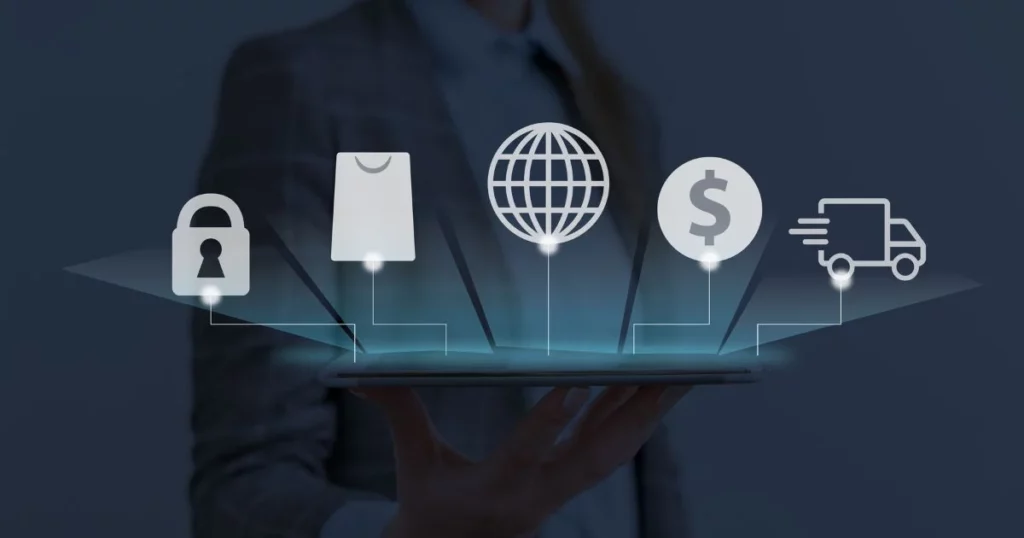
Here’s how they boost the critical aspect of online businesses:
1. Quick Order Handling
These services excel at processing orders, moving from placement to shipment fast. This cuts down wait times and keeps customers happy.
2. Order Accuracy
With precise order management systems. Errors are minimized, ensuring customers receive the right items every time they shop.
3. Scalability
As your business grows, these services can easily ramp up order processing. To meet increased demand without sacrificing speed or accuracy.
4. Advanced Technology
Leveraging cutting-edge tech, they automate tasks. Slashing manual errors and making the whole process faster and more precise.
5. Inventory Management
Their efficient systems keep track of stock levels in real time. Ensuring popular items are always available and avoiding both shortages and excess stock.
6. Flexibility
Fulfillment services offer adaptable solutions. Letting you tailor workflows to suit your needs. And respond quickly to market changes.
7. Shipping Optimization
By teaming up with trusted carriers and using smart shipping tech. To reduce delivery times and expenses, they identify the most efficient routes and techniques.
8. Returns Management
Handling returns efficiently is crucial. These services manage returns swiftly, processing refunds or exchanges to keep customers satisfied.
9. Customer Communication
Keeping customers in the loop is key. Fulfillment services provide updates on order status, shipping, and any issues that arise, building trust.
Key Features and Benefits of Ecommerce Fulfillment Solutions
The key features and benefits of an ecommerce fulfillment solution include:
Features:
- Order Processing: Handle customer orders efficiently from start to finish.
- Inventory Management: Keep track of product levels in real-time.
- Picking and Packing: Pack orders accurately and securely.
- Shipping and Logistics: Arrange prompt delivery to customers.
- Returns Management: Manage returns and exchanges smoothly.
- Technology Integration: Easily work with ecommerce platforms.
- Customer Support: Provide helpful assistance throughout.
- Quality Control: Ensure products are top-notch.
- Customization: Offer special packaging options.
Benefits:
- Efficiency: Save time and resources.
- Accuracy: Keep customers happy with correct orders.
- Scalability: Grow your business smoothly.
- Cost-Effectiveness: Save money on shipping and operations.
- Customer Satisfaction: Build loyalty with fast service.
- Flexibility: Adapt to changing needs easily.
- Competitive Advantage: Stand out from the competition.
- Data-Driven Decisions: Make smart choices based on data.
- Concentrate on Core Business: Invest more time in expanding your company.
Conclusion
In conclusion, getting ecommerce orders right is crucial for online success. Whether you handle it in-house or through third-party services. For example like Amazon Fulfillment Services or Shiprocket, efficiency is key.
These services provide everything from processing orders to shipping. Ensuring happy customers and business growth. In India, options like Flipkart and Blinkstore offer reliable solutions too. So, choose wisely and watch your ecommerce venture thrive!
FAQs on Ecommerce Fulfillment
What is ecommerce fulfillment?
The process of managing and sending clients’ online orders is known as e-commerce fulfillment. It includes tasks like receiving orders, packing products, and shipping them out.
How do you fulfill an ecommerce order?
Fulfilling an ecommerce order involves receiving the order details, picking the products from inventory, packing them securely, and arranging for delivery to the customer’s address.
What is a fulfillment process?
The fulfillment process refers to the series of steps involved in processing and delivering ecommerce orders. It encompasses order receiving, inventory management, order picking and packing, and shipping.
Why does ecommerce fulfillment matter?
Fulfillment is vital in ecommerce because it directly affects customer satisfaction. A smooth process ensures accurate and timely delivery, keeping customers happy and coming back for more.
What’s ahead for ecommerce fulfillment?
The future of ecommerce fulfillment is all about automation and technology. Innovations like robotics and AI will streamline processes, cut costs. And make everything more efficient for an even better customer experience.
